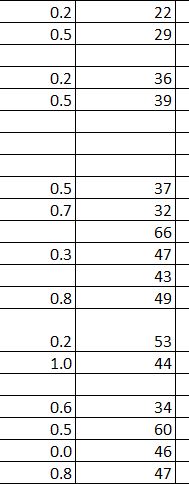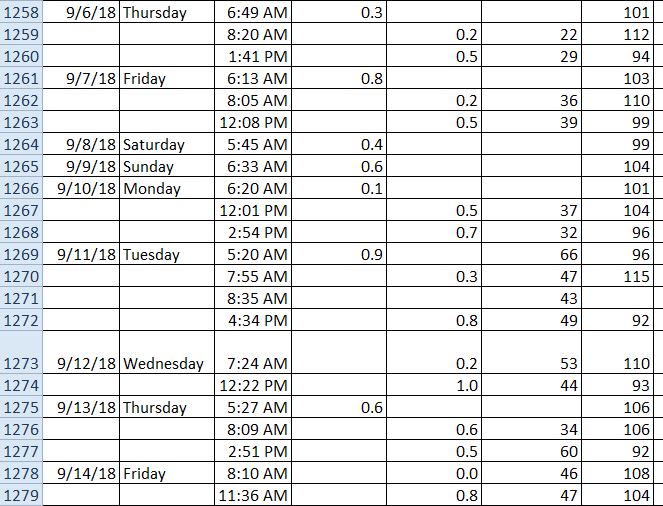I am currently at 60 hours fasted and just read 0.4mmol but it may be a dawn reading.
I don’t really think I need this blood ketone monitor anymore.
It just drives me batty.
I know I am on the right track lol, I feel great today.
Thanks for all the wonderful information!
I have gently been flexing this fasting muscle of mine.
I started off with normal 24s, 36s, 48s, 60s, 72 hours, I do wonder if I can get to 90 or 100.
I’ve lost 5 pounds so far, with a total loss of 32lbs.
I am on the final stretch!
0.0 ketones after 38 hours fasted?
But the elephant in the room is Breath Acetone (BrAce) which is a true measure of one’s current fat metabolism levels. A cheap breathalyser will indicate if one is excreting acetone in the breath. A more expensive acetone meter will give a well calibrated reading. In my opinion measuring blood ketones is futile unless one has Type 1 diabetes.
In relation to ketosis our bodies are like automobiles. Blood ketone (BOHB) measurement results equate to the fuel gauge which reflects the amount of gasoline in the tank (blood stream). Breath acetone (BrAce) is the speedometer reading indicating the actual speed of fat metabolism at the time of measurement.
My BOHB and breath acetone readings don’t appear to be correlated - at all. Left is BOHB, right is breath from ketonix (first version):

if your tissues are rapidly uptaking ketones you will see a low measurement. this happens post exercise as well.
I would like to ask for some research to back up this assertion, please. Any chance you could provide links to some papers?
The only paper on the topic of measuring acetone in the breath that I have been able to find on PubMed is one trying to establish that measuring acetone in the breath was a reliable marker for the serum β-hydroxybutyrate level. The paper wasn’t entirely convincing, and it was by a researcher who worked for a a company that manufactured breath analyzers, and the company paid for the study. I believe the company was trying to make a case for its product.
Nevertheless, the claim that breath acetone is a reliable (and cheaper) marker for serum β-hydroxybutyrate is a far cry from saying that excreted acetone is a true measure of fat metabolism. If there is any research out there to support the latter assertion, I’d be very interested to take a look at it.
Paul, we’ve been here before:
Maybe that will suffice for you again?
If I didn’t know you better, I’d say you do seem to do a pretty good “Dog in the Manger” impression in relation to the topic of the validity of measuring Breath Acetone versus measuring blood BOHB.
You’ll also notice that I provided you with the article that you are now quoting from PubMed.
Many people on this forum use breathalysers as a cheap tool to confirm that they are in Ketosis. Why knock something that works because there is no corporate behemoth promoting them for “off-label” use as there is no profit in it and that’s why there is not much published research.
I have been using such a device for over a year and I find it truly informative. It keeps me true to the Keto WOE without measuring macros and obsessing about making progress or not. I measure Breath Acetone, I know whether I’m in Ketosis or not and if so what level of Ketosis; Nothing could be simpler or more satisfying. Compare that with what seems like 2-3 threads a week on this forum about people having problems understanding their Blood Ketone levels.
As I said in both threads, I don’t find that study convincing. Firstly, I don’t know of any mechanism for measuring fat metabolism directly except RQ, and that’s not something that we can do at home. (And even RQ only tells what proportion of fat versus glucose is being metabolized, not the quantity of either—or so I understand.) Secondly, that study makes several assumptions that don’t appear to be justified, so to say that exhaled acetone is a “more accurate” measure of fat metabolism than measuring serum BOHB seems to be a wild leap, in the absence of any other studies. Particularly when the only claim that one study makes is that it is a reliable marker for serum BOHB levels.
If you had said it was a “cheaper, reasonably reliable substitute” for measuring BOHB, then I’d certainly have gone along with you, because it’s an assertion that is quite in line with the available research. But even that assertion relies on the assumption that the body is producing enough acetone to be able to waste some in the breath before it gets used, whereas BOHB remains in the bloodstream until use and doesn’t get wasted. For that reason, I would consider it an ultimately more reliable, albeit much more expensive, marker for ketone production than either urinary acetoacetate or breath acetone.
Personally, I don’t measure my ketones at all. If I really needed to know how much I was producing, I’d buy a blood monitor by preference, and hang the expense. If I were to give my inner Scotsman free rein, however, a cheap breathalyzer is the way I’d go, for sure.
(Of course, the question of how many of the ketone bodies produced by the liver are actually getting used is a whole other matter, which we really don’t need to go into, lol!  It sure would be nice to be able to measure that, however.)
It sure would be nice to be able to measure that, however.)
Let’s not discuss one study which was published to “pump” the LEVL device by it’s promoters which my research in that thread led me to subsequently conclude.
A Respiratory Quotient measuring device is being developed at the moment and will be available to the public for purchase probably within 2 years at around $200.
I’d never say that because it does not correlate in any way with measuring BOHB.
Yes, Breathalysers are a cheap way to measure ketosis as there are no consumables. Even Ivor Cummings and AFAIK Dr. Jeffry Gerber use the Ketonix and recommend it in their book " Eat Rich, Live Long: Mastering the Low-Carb & Keto Spectrum for Weight Loss and Longevity" as the go-to means of measuring ketosis.
People with Epilepsy are able to get off epilepsy drugs because of the Ketonix; These devices work in the real world in what can be a very much life and death scenario.
You can play with semantics and pedantics all you like but please leave off the rigours of research angle; We know what commercial research has done for human health in the last 60 years.
You seem to be a self-appointed auditor of techniques for measuring ketones from a purely theoretical level. I for one am totally convinced by the merits of measuring breath acetone.
I am not a fan of measuring ketones in the urine or blood which is the path that most people follow because nobody objects to that but these people are often misled and confused by contributors who seem to follow certain Gurus out there.
(I do plan to measure blood glucose in the not too distant future.)
I think they measure two different things, and the relationship between them isn’t obvious or even known. Here’s some data for you. I’m using two different KetoMojos (leftmost before the time is home, to the right is work), using the same calibrated strips. I’m using the first model of the ketonix, connected to computer to get the data. The third row to the left after the time is the ketonix), and I’ve included blood sugar taken by Contour Next EZ.
Say you look at 0.2 BOHB, the ketonix can go from 22 to 53. And I can find these examples throughout my spreadsheet (yes, I have over 1,300 samples).
Yes Bob, there is no correlation between blood BOHB and breath Acetone.
With the Ketonix your are in Nutritional Ketosis from 4-30PPM and High Nutritional Ketosis from 30-80PPM.
(You use the Ketonix at work, mostly, like myself).
BOHB readings can be all over the place. Stick with the Ketonix (and Blood Glucose), the rest is noise!
Yet the study you posted makes the precise claim that the correlation between BOHB and breath acetone is so reliable that the breath meter can be used instead of testing serum BOHB.
I had already answered that fallacious argument:
But you had discounted the report already…
Seemingly in the region of 90% of commercially funded pharma-medical research papers are not published; there maybe up to nine unpublished research papers that couldn’t prove the link. The paper is a sort of a literature review of very small studies having tenuous links the subject but the conclusions drawn surely satisfy the paymasters.
I’m a bit late to the party but came from a link to this thread posted in a recent topic. I purchased an indirect calorimeter with both an O2 sensor and a Co2 sensor, so I can indeed measure RQ. The problem is that it doesn’t work for people who are water fasting, and even people in deep ketosis give funny readings. For example, the minimum RQ value you should be able to get is .7 (pure fat). However in practice, even lab grade indirect calorimeters will give back RQ results of .62 during an extended water fast! That’s not even possible, and in reality it is the reading that is incorrect. Apparently, the source of the error is the partial desaturation of fatty acids. This isn’t the only source of error, and some folks in normal ketosis have indicated RQ values much higher than possible from DexaFit facilities. In short, it’s hard to trust an RQ while in ketosis, or while water fasting. Take a look at this:





